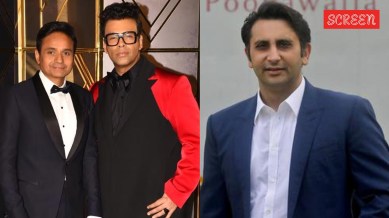Click here to follow Screen Digital on YouTube and stay updated with the latest from the world of cinema.

Filmmaker Karan Johar signed a Rs 1000 crore deal last year, to sell 50% stake of Dharma Productions to billionaire Adar Poonawalla, through his company Serene Productions. The rest of the 50% stake still belongs to Karan as Executive Chairman and CEO Apoorva Mehta. Now, in a recent interview, the filmmaker opened up about selling half of his production company for expansion.
During a candid chat with Komal Nahta on his YouTube channel Game Changers, Karan said, “I had many dreams that weren’t able to get fulfilled because there was a funding issue. I was very clear that I am okay to sell 50% of my company or to sell equity, only because I want to expand. I want to leave many legacies behind, within the company. Me and Apoorva, who work like brothers, had decided that we would do this but we needed the right partner.”
Talking about how the deal with the Serun Institute’s owner, he revealed, “It so happened eventually that Adar and his wife Natasha have been my close friends, very dear to me. He picked up the phone one day and said that I am interested, but I told him that this is not your business. He said he also wanted to expand.”
The filmmaker appreciated his partner Apoorva for handling the business aspects of Dharma Productions. “Apoorva is the most correct human. Our accounts are perfect down to the last rupee. He runs it like a proper well-oiled machinery. I don’t know where I would have been without him. He is literally doing my father’s work, also like a brother, managing the company like family. Unke bagair mai bikhar jaata. I am a creative person. I have no understanding on business and numbers. He really led that, he is the spine of the company,” he said.
In fact, he was the one who asked Karan to lock the deal. “Apoorva said that Adar is great – he is a friend, compassionate and wants to expand. So, we haven’t lost any creative control. There are cheques and balances because when there’s a partner, you become more accountable. We got an investment for expansion, I was able to immediately open a distribution arm and talks are going on to do something big with the music arm. Adar is wonderful, compassionate and has a sharp mind in business. He is somebody we turn to, when we want to do bigger deals. Apoorva and I lean on him for advice,” he added.
However, it was new for Karan Johar to make films while considering profitability. “Every deal has its own advantages and responsibilities. There was never accountability before this, I just learned the term quarter. Apoorva keeps me on my toes, he says, ‘Not profitable, don’t do it’, because I had already taken many decisions creatively. I wanted to make certain films for creative satisfaction and to move the bar of cinema. There are many films that weren’t box office hits but are still remembered for what they were. I want to make those films as well.”
The 53-year-old continued, “But now, you have to take every decision with profitability. It is very important to be profitable, we are a commercial enterprise. I made Homebound, worldwide critically acclaimed, but I can’t say if I’ll take such decisions in the future or not. I will feel upset, but I chose this deal for a reason – growth. Growth comes from profit, and profit comes from profitability. I will always be artistic, but it is important to be commercial as well.”
When asked if Dharma was in jeopardy without selling the stakes earlier, Karan replied, “It’s not like our company was getting shut. We were profitable, things were going fine, we would have been continuously profitable. We were a boutique studio and were happy being a boutique studio. We were both well settled, we had money, name and fame. We did this deal only for growth, that potential would have been restricted. Life would be still going on. We were a zero debt company. You take those loans from banks, but it has always been paid on time.”
Click here to follow Screen Digital on YouTube and stay updated with the latest from the world of cinema.